苏教版_六年级英语(下)6BUnit6第六单元短语、词汇、知识点梳理知识汇总知识归纳总结资料_复习大
苏教版译林小学英语六年级下册6B全册复习重点知识点整理
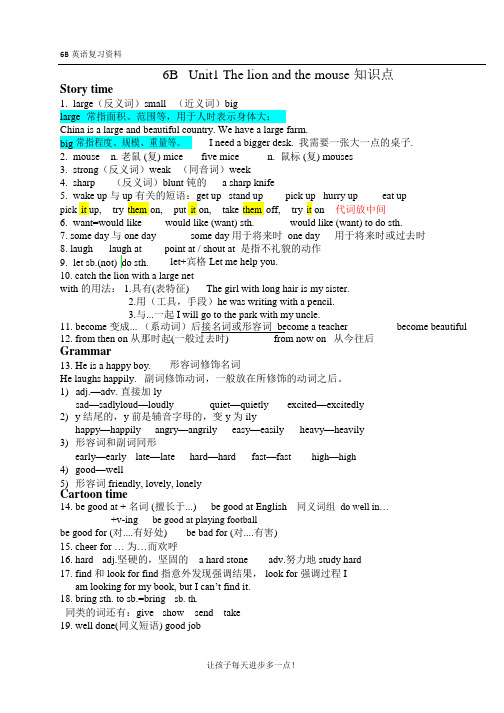
6B英语复习资料6B Unit1 The lion and the mouse 知识点Story timerge(反义词)small (近义词)biglarge常指面积、范围等,用于人时表示身体大;China is a large and beautiful country. We have a large farm.big常指程度、规模、重量等。
I need a bigger desk. 我需要一张大一点的桌子.2.mouse n. 老鼠 (复) mice five mice n. 鼠标 (复) mouses3.strong(反义词)weak (同音词)week4.sharp(反义词)blunt 钝的 a sharp knife5.wake up 与 up 有关的短语:get up stand up pick up hurry up eat uppick it up,try them on,put it on,take them off,try it on代词放中间6.want=would like would like (want) sth.would like (want) to do sth.7. some day 与 one day some day 用于将来时 one day用于将来时或过去时8. laugh laugh at point at / shout at 是指不礼貌的动作9.let sb.(not)do sth.let+宾格 Let me help you.10. catch the lion with a large netwith 的用法: 1.具有(表特征)The girl with long hair is my sister.2.用(工具,手段)he was writing with a pencil.3.与...一起 I will go to the park with my uncle.11. become 变成... (系动词)后接名词或形容词 become a teacher become beautiful12. from then on 从那时起(一般过去时)from now on从今往后Grammar13. He is a happy boy.形容词修饰名词He laughs happily. 副词修饰动词,一般放在所修饰的动词之后。
苏教版六年级英语下知识点

苏教版六年级英语下知识点下面是苏教版六年级英语下学期的知识点总结。
Unit 1: Countries and Nationalities- Learn the names of different countries and their corresponding nationalities.- Practice using the question "Where are you from?" and answering with the appropriate nationality.- Understand and use the verb "be" to describe nationality, e.g., "I am Canadian."Unit 2: Daily Routines- Familiarize yourself with common daily routines and activities.- Learn how to describe actions in the present tense, e.g., "I eat breakfast at 7 o'clock."- Practice asking and answering questions about daily routines.Unit 3: Hobbies and Interests- Learn vocabulary related to hobbies and interests, e.g., "playing basketball," "collecting stamps."- Describe your own hobbies and interests using the sentence pattern "I like + (verb/ activity)."- Engage in conversations about hobbies, asking questions like "What's your favorite hobby?"Unit 4: Food and Drinks- Expand your vocabulary related to food and drinks.- Practice using countable and uncountable nouns, e.g., "an apple" vs. "some milk."- Develop the ability to order food and drinks in a restaurant using phrases like "I would like..."Unit 5: Health and Body- Learn vocabulary related to parts of the body, illnesses, and health habits.- Practice expressing physical conditions and giving advice, e.g., "I have a headache. You should rest."- Understand and use comparative and superlative adjectives to describe health, e.g., "healthier," "the healthiest."Unit 6: Travel and Directions- Familiarize yourself with vocabulary related to travel, transportation, and giving directions.- Practice asking for and giving directions using phrases like "Excuse me, how do I get to...?"- Understand and use prepositions of place, e.g., "next to," "across from."Unit 7: Weather and Seasons- Learn weather-related vocabulary, e.g., "sunny," "rainy," "stormy."- Understand and use simple present tense to describe the weather, e.g., "It often rains in spring."- Engage in conversations about weather, asking questions like "What's the weather like today?"Unit 8: Occupations- Expand your vocabulary related to different occupations and professions.- Practice using the question "What do you want to be when you grow up?" and answering with future career aspirations.- Learn to describe job responsibilities using action verbs, e.g., "Doctors help sick people."Unit 9: Festivals and Celebrations- Learn about different festivals and celebrations around the world.- Practice talking about your favorite festivals and describing the traditions and activities associated with them.- Understand and use present continuous tense to talk about ongoing celebrations, e.g., "They are dancing at the carnival."以上是苏教版六年级英语下学期的知识点总结。
最新译林牛津苏教版小学英语六年级下册 6B 《Unit6 An interesting country》教案
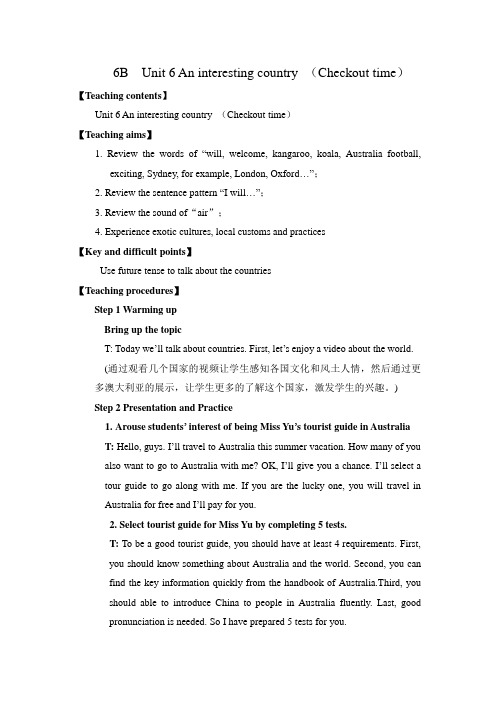
6B Unit 6 An interesting country (Checkout time)【Teaching contents】Unit 6 An interesting country (Checkout time)【Teaching aims】1. Review the words of “will, welcome, kangaroo, koala, Australia football,exciting, Sydney, for example, London, Oxford…”;2. Review the sentence pattern “I will…”;3. Review the sound of“air”;4. Experience exotic cultures, local customs and practices【Key and difficult points】Use future tense to talk about the countries【Teaching procedures】Step 1 Warming upBring up the topicT: Today we’ll talk about countries. First, let’s enjoy a video about the world.(通过观看几个国家的视频让学生感知各国文化和风土人情,然后通过更多澳大利亚的展示,让学生更多的了解这个国家,激发学生的兴趣。
)Step 2 Presentation and Practice1.Arouse students’ interest of being Miss Yu’s tourist guide in AustraliaT: Hello, guys. I’ll travel to Australia this summer vacation. How many of you also want to go to Australia with me? OK, I’ll give you a chance. I’ll select a tour guide to go along with me. If you are the lucky one, you will travel in Australia for free and I’ll pay for you.2. Select tourist guide for Miss Yu by completing 5 tests.T: To be a good tourist guide, you should have at least 4 requirements. First, you should know something about Australia and the world. Second, you can find the key information quickly from the handbook of Australia.Third, you should able to introduce China to people in Australia fluently. Last, good pronunciation is needed. So I have prepared 5 tests for you.Test 1 Good memoryTest 2 MatchTest 3 Take notes(通过告诉学生,成为导游可以暑假免费去澳大利亚旅游,激发学生成为导游的兴趣,继而鼓励学生挑战任务。
苏教英语译林小学六年级下学期6B必默内容(2021年整理)

苏教英语译林小学六年级下学期6B必默内容(word版可编辑修改) 编辑整理:尊敬的读者朋友们:这里是精品文档编辑中心,本文档内容是由我和我的同事精心编辑整理后发布的,发布之前我们对文中内容进行仔细校对,但是难免会有疏漏的地方,但是任然希望(苏教英语译林小学六年级下学期6B必默内容(word版可编辑修改))的内容能够给您的工作和学习带来便利。
同时也真诚的希望收到您的建议和反馈,这将是我们进步的源泉,前进的动力。
本文可编辑可修改,如果觉得对您有帮助请收藏以便随时查阅,最后祝您生活愉快业绩进步,以下为苏教英语译林小学六年级下学期6B必默内容(word版可编辑修改)的全部内容。
Unit 1词组:rge and strong 又大又强壮2. walk by 走过3.wake the lion up 叫醒狮子 4。
say quietly 小声地说5.small and weak 又小又虚弱 6。
laugh loudly 大声地笑7.let the mouse go 让老鼠走掉 8。
catch the lion with a large net 用一张大网捉住狮子9.bite the net with his sharp teeth 用他锋利的牙齿咬网 10。
get out 出去11.say sadly 伤心地说 12. just then 就在那时13.make a big hole 弄出一个大洞 14. say happily 高兴地说15.from then on 从那时起 16。
become friends 成为朋友17.be good at table tennis 擅长乒乓球 18。
cheer for them loudly 为他们大声欢呼19.hit the ball hard 努力地打球 20。
find a hole in the ground 在地上发现一个洞21.too deep 太深 22。
六年级下册英语知识点苏教版

六年级下册英语知识点苏教版1.语法知识:
-动词时态:一般现在时、一般过去时、将来时
-名词:可数名词和不可数名词的用法、名词所有格
-形容词和副词的比较级和最高级
-基本句型和疑问句
-情态动词的用法
2.词汇积累:
-动词、形容词和副词的常见词汇
-食物、家庭、交通工具、节日等话题相关的词汇
-数字、时间、日期、星期等基本词汇
-人称代词、物主代词、疑问代词、指示代词等
3.句型和表达:
-描述人物外貌和性格特点
-谈论喜欢和不喜欢的事物
-表达能力和日常活动
-向他人提出请求和邀请
-谈论过去和将来的计划
4.阅读理解:
-短文阅读理解,包括填空、选择和判断题型
-根据短文内容回答问题
-根据短文内容完成句子
以上是六年级下册英语知识点的概述,具体的教材内容可能会有所不同。
建议根据实际教材进行更详细的学习和复习。
六下英语Unit6知识点总结
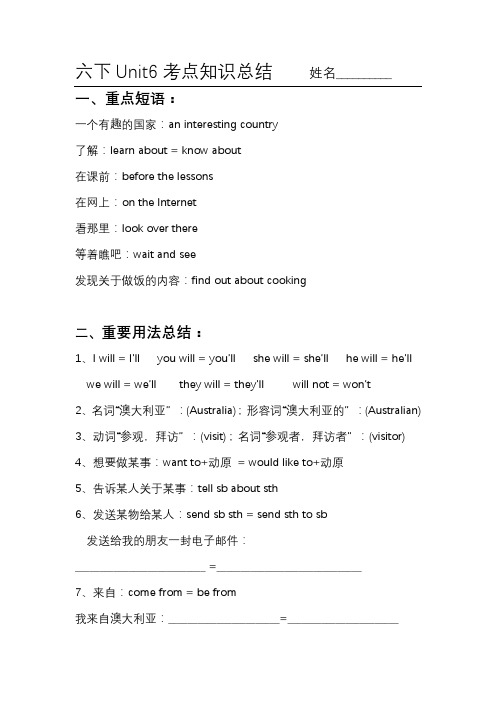
六下Unit6考点知识总结姓名__________一、重点短语:一个有趣的国家:an interesting country了解:learn about = know about在课前:before the lessons在网上:on the Internet看那里:look over there等着瞧吧:wait and see发现关于做饭的内容:find out about cooking二、重要用法总结:1、I will = I’ll you will = you’ll she will = she’ll he will = he’ll we will = we’ll they will = they’ll will not = won’t2、名词“澳大利亚”:(Australia) ; 形容词“澳大利亚的”:(Australian)3、动词“参观,拜访”:(visit) ; 名词“参观者,拜访者”:(visitor)4、想要做某事:want to+动原= would like to+动原5、告诉某人关于某事:tell sb about sth6、发送某物给某人:send sb sth = send sth to sb发送给我的朋友一封电子邮件:___________________________ =______________________________7、来自:come from = be from我来自澳大利亚:_______________________=_______________________8、look for 译为:(寻找)look at 译为:(看)look after 译为:(照顾)look out for译为:(当心)look out of 译为:(朝…外看)9、interesting/exciting 修饰(物);interested/excited 修饰(人)10、在中国:in China 在澳大利亚:in Australia在英国:in the UK 在美国:in the US11、cook 动词“(做饭)”;名词“(厨师)”。
苏教版六年级下册英语必背知识点
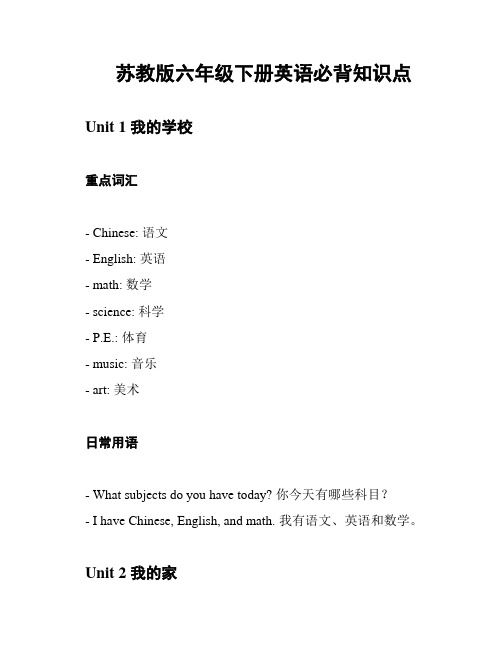
苏教版六年级下册英语必背知识点Unit 1 我的学校重点词汇- Chinese: 语文- English: 英语- math: 数学- science: 科学- P.E.: 体育- music: 音乐- art: 美术日常用语- What subjects do you have today? 你今天有哪些科目?- I have Chinese, English, and math. 我有语文、英语和数学。
Unit 2 我的家重点词汇- father: 父亲- mother: 母亲- parents: 父母- sister: 姐妹- brother: 兄弟- grandfather: 爷爷- grandmother: 奶奶- uncle: 叔叔- aunt: 阿姨- cousin: 表兄弟姐妹日常用语- This is my family photo. 这是我的家庭照片。
- Who’s this? 这是谁?- She’s my mother/He’s my father/They are my parents. 她/他/他们是我的父母。
Unit 3 好惯重点词汇- early: 早的- late: 迟的- brush: 刷- teeth: 牙齿- wash: 洗- hands: 手- face: 脸- have breakfast: 吃早餐- have lunch: 吃午餐- have supper: 吃晚餐日常用语- What time do you get up? 你几点起床?- I get up at six o'clock. 我六点钟起床。
- What do you do in the morning? 你早上做什么?- I brush my teeth and wash my face. 我刷牙洗脸。
Unit 4 日常安排重点词汇- do homework: 做家庭作业- read books: 看书- watch TV: 看电视- play sports: 做运动- take a walk: 散步- go shopping: 购物日常用语- What do you do after school? 放学后你干什么?- I do my homework, read books and play sports. 我做家庭作业、看书和做运动。
苏教版六年级英语unit6知识归纳
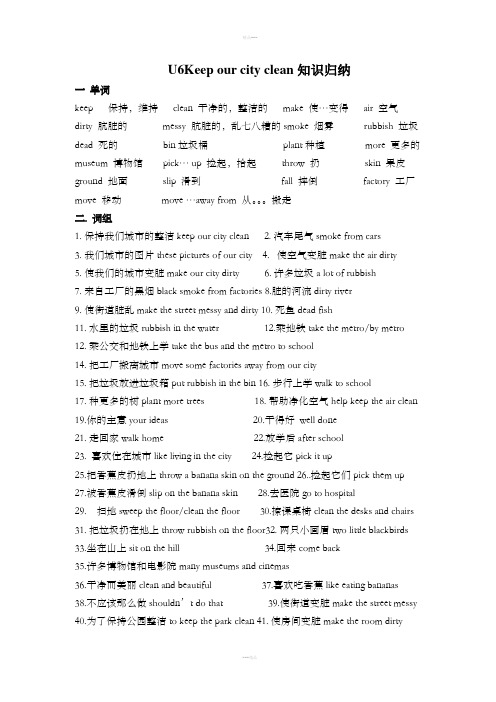
U6Keep our city clean知识归纳一单词keep 保持,维持clean 干净的,整洁的make 使…变得air 空气dirty 肮脏的messy 肮脏的,乱七八糟的smoke 烟雾rubbish 垃圾dead 死的bin垃圾桶plant种植more 更多的museum 博物馆pick… up 捡起,拾起throw 扔skin 果皮ground 地面slip 滑到fall 摔倒factory 工厂move 移动move …away from 从。
搬走二. 词组1. 保持我们城市的整洁keep our city clean2. 汽车尾气smoke from cars3. 我们城市的图片these pictures of our city4. 使空气变脏make the air dirty5. 使我们的城市变脏make our city dirty6. 许多垃圾a lot of rubbish7. 来自工厂的黑烟black smoke from factories 8.脏的河流dirty river9. 使街道脏乱make the street messy and dirty 10. 死鱼dead fish11. 水里的垃圾rubbish in the water 12.乘地铁take the metro/by metro12. 乘公交和地铁上学take the bus and the metro to school14. 把工厂搬离城市move some factories away from our city15. 把垃圾放进垃圾箱put rubbish in the bin 16. 步行上学walk to school17. 种更多的树plant more trees 18. 帮助净化空气help keep the air clean 19.你的主意your ideas 20.干得好well done21. 走回家walk home 22.放学后after school23. 喜欢住在城市like living in the city 24.捡起它pick it up25.把香蕉皮扔地上throw a banana skin on the ground 26..捡起它们pick them up 27.被香蕉皮滑倒slip on the banana skin 28.去医院go to hospital29. 扫地sweep the floor/clean the floor 30.擦课桌椅clean the desks and chairs 31. 把垃圾扔在地上throw rubbish on the floor32. 两只小画眉two little blackbirds 33.坐在山上sit on the hill 34.回来come back35.许多博物馆和电影院many museums and cinemas36.干净而美丽clean and beautiful 37.喜欢吃香蕉like eating bananas 38.不应该那么做shouldn’t do that39.使街道变脏make the street messy 40.为了保持公园整洁to keep the park clean 41. 使房间变脏make the room dirty42. 太晚了too late三句子1.Look at these pictures of our city.Is it clean?2.What makes our city dirty? 什么让我们的城市变脏?3.Smoke from cars make the air dirty. 汽车的尾气使空气变脏(污染)4.Black smoke from factories makes the air dirty.工厂的黑烟使使空气变脏(污染)5.Rubbish makes the streets messy and dirty. 垃圾使街道乱和肮脏。
苏教版六年级英语(下)6BUnit6第六单元测试单元练习单元小测验

U6练习一.will 一般将来时的四大句式1.肯定句(1)We will a film and a picnic tonight. A. watch, have B. watched, had C. watch, had D. watched, have (2)【易错】I think that the weather hot this summer. A. will be B. is C. become D. be (3)There _____ a football game tomorrow afternoon. A. was B. will be C. is going to have D. will have (4)【易错】Let (we) (play) basketball this afternoon. 2.否定句(1)We (not fly) kites next weekend. (2)I 'll come with my uncle this afternoon.(改为否定句) 3. 一般疑问句(1)Will you ____fish ___me? Yes, I ____. A. cooking, to, will B. cook, for, do C. cook, for, will (2)Are you going ____________(play) the piano? (3) they (watch) the World Cup tomorrow? 4. 特殊疑问句(1)--What Helen ? --S he’s writing an email.She’s writing an email. A.is, going to do B. will, do C. are, doing D. is, doing (2)(2)I’ll ask I’ll ask m y e-friend in Australia.(my e-friend in Australia.(对划线部分提问) ask? (3)(3)They’re going to They’re going to come home at 4:30.(对划线部分进行提问)_______ are _______ to come home? 二. visit 和 visitor (1)每年许多观光客参观澳大利亚。
六年级英语知识点第六单元

六年级英语知识点第六单元Unit 6:AnimalsIn this unit, we will explore various topics related to animals. We will learn about different animals, their characteristics, habitats, and habits. Let's dive into the fascinating world of animals!1. Classification of AnimalsAnimals are grouped into different categories based on their characteristics and traits. The main groups include mammals, birds, fish, reptiles, amphibians, and insects. Each group has unique features that distinguish them from one another.2. Characteristics of MammalsMammals are warm-blooded vertebrates that give birth to live young and nurse them with milk. They have fur or hair on their bodies. Some common examples of mammals are dogs, cats, elephants, and humans.3. Birds and Their AdaptationsBirds are warm-blooded animals that have feathers and lay eggs. They have beaks for eating and wings for flying. Birds have adapted to different environments such as deserts, forests, and oceans. They use their beaks to catch prey or gather nectar.4. The World of FishFish are cold-blooded animals that live in water. They have gills that allow them to breathe underwater. They use fins to swim and scales to protect their bodies. Fish come in various shapes, sizes, and colors. Examples of fish include goldfish, sharks, and tuna.5. Reptiles and Their CharacteristicsReptiles are cold-blooded vertebrates that have dry scaly skin. They lay eggs and are often found in warm climates. Some well-known reptiles are snakes, turtles, crocodiles, and lizards. Reptiles are ectothermic, meaning they rely on external heat sources to regulate their body temperature.6. Amphibians and Their Life CycleAmphibians are cold-blooded vertebrates that live both on land and in water. They go through a metamorphosis during their life cycle,starting as aquatic larvae and developing into adults with the ability to live on land. Frogs, toads, and salamanders are examples of amphibians.7. Exploring the Insect WorldInsects are the largest group of animals on Earth, with over a million known species. They have three main body parts: head, thorax, and abdomen. Insects have six legs and often have wings. Some common insects include bees, butterflies, ants, and beetles.8. Endangered AnimalsUnfortunately, many animal species are facing the threat of extinction due to various reasons such as habitat loss, pollution, and poaching. It is essential to raise awareness and take action to protect endangered animals and their habitats.That concludes our exploration of the sixth unit on animals. By understanding the different characteristics and habits of animals, we can develop a greater appreciation and respect for the diverse creatures that share our planet. Let's continue to learn and protect the remarkable animal kingdom.。
苏教版英语 6b unit6 知识点+试卷

6B Unit 6 An interesting country一、单词:1. country国家一个有趣的国家乡下在乡下2. will 将,将要一般将来时态助动词,will do sth.= do sth. 将要做3. learn学习学语文/英语互相学习了解,得知4. magazine杂志可数名词,一些杂志读一本体育杂志5. Kanga’roo袋鼠复数形式:kangaroosA kangaroo is a large Australian animal which moves by jumping on its back legs. Female kangaroos carry their babies in a pouch on their stomach.6. koala[koʊˈɑlə] 考拉复数形式:koalasA koala or a koala bear is an Australian animal which looks like a small bear with grey fur and lives in trees.7. sport-lovers体育运动爱好者8. exciting令人激动的,令人兴奋的9. Sydney悉尼 the largest Australian city10.Welcome(1)vt. 欢迎欢迎某人欢迎回来欢迎来到某地(2)adj.受欢迎的,令人愉快的一个受欢迎的变化New members are always welcome(3)You are welcome不客气,没关系,用来回答thank you.-Thank you for your help.-You are welcome.(4)Vt. 乐于接受我乐意接受你的帮助.11.visitor游客visitorsVisit vt. 参观,游览,拜访visit sb. /sp.12.send发送寄信发邮件13.London伦敦伦敦是英国的首都。
202X年最新苏教版译林版英语六年级下册知识点汇总
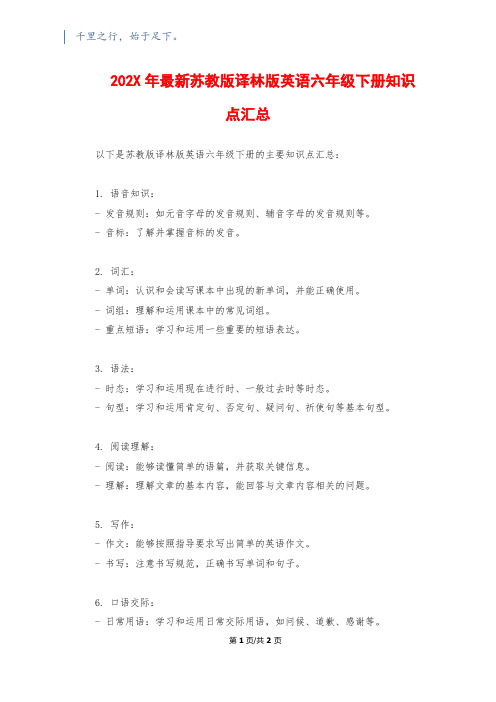
千里之行,始于足下。
202X年最新苏教版译林版英语六年级下册知识
点汇总
以下是苏教版译林版英语六年级下册的主要知识点汇总:
1. 语音知识:
- 发音规则:如元音字母的发音规则、辅音字母的发音规则等。
- 音标:了解并掌握音标的发音。
2. 词汇:
- 单词:认识和会读写课本中出现的新单词,并能正确使用。
- 词组:理解和运用课本中的常见词组。
- 重点短语:学习和运用一些重要的短语表达。
3. 语法:
- 时态:学习和运用现在进行时、一般过去时等时态。
- 句型:学习和运用肯定句、否定句、疑问句、祈使句等基本句型。
4. 阅读理解:
- 阅读:能够读懂简单的语篇,并获取关键信息。
- 理解:理解文章的基本内容,能回答与文章内容相关的问题。
5. 写作:
- 作文:能够按照指导要求写出简单的英语作文。
- 书写:注意书写规范,正确书写单词和句子。
6. 口语交际:
- 日常用语:学习和运用日常交际用语,如问候、道歉、感谢等。
第1页/共2页
锲而不舍,金石可镂。
- 对话:能够根据情景进行简单的对话交流。
以上为对苏教版译林版英语六年级下册的知识点进行了简要的概括总结。
具体的知识点和内容请参考教材或教师指导。
六年级英语第六单元知识点

六年级英语第六单元知识点在六年级的英语学习中,第六单元是一个重要的学习阶段。
本单元主要涵盖了一些基础的语法和词汇知识,下面将对这些知识点进行详细的介绍。
一、动词时态动词时态是英语中一个非常重要的语法知识点。
它表示动作发生的时间。
在第六单元中,我们学习了一些常用的动词时态,包括一般现在时、一般过去时和将来时。
1.一般现在时:表示经常性的动作或客观事实。
常用的动词规则变化主要有:第三人称单数的动词加-s;一般情况下,其他人称和复数形式不变。
例如:I like playing basketball.(我喜欢打篮球。
)2.一般过去时:表示过去某个时间发生或完成的动作。
常用的动词规则变化主要有:动词过去式的构成大部分在词尾加-ed。
例如:He visited his grandparents last summer.(去年夏天他去拜访他的祖父母。
)3.将来时:表示将来某个时间发生的动作。
常用的表示将来时的助动词有will和be going to。
例如:They will have a party tomorrow.(他们明天将开一个派对。
)二、词汇知识词汇是语言学习中不可或缺的一部分。
在第六单元中,我们学习了一些与日常生活相关的词汇,如颜色、食物、动物等。
下面列举了一些典型的例子:1.颜色:red(红色)、blue(蓝色)、yellow(黄色)、green (绿色)等。
2.食物:apple(苹果)、banana(香蕉)、rice(米饭)、noodle(面条)等。
3.动物:cat(猫)、dog(狗)、elephant(大象)、lion(狮子)等。
三、句型构造在六年级的英语学习中,句型构造是一个重要的知识点。
在第六单元中,我们学习了一些常见的句型构造。
1.肯定句:主语 + 动词 + 其他成分。
例如:She is a student.(她是一名学生。
)2.否定句:主语 + 动词 + not + 其他成分。
例如:He does not like swimming.(他不喜欢游泳。
六下Unit-6-单元复习总结
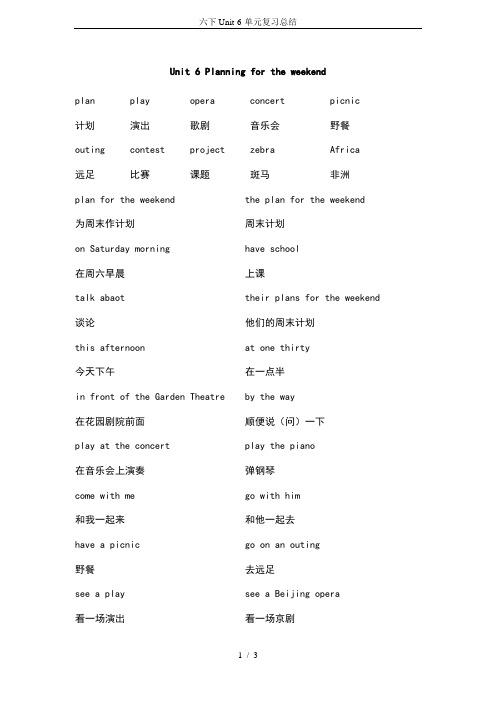
Unit 6 Planning for the weekendplan play opera concert picnic计划演出歌剧音乐会野餐outing contest project zebra Africa远足比赛课题斑马非洲plan for the weekend the plan for the weekend为周末作计划周末计划on Saturday morning have school在周六早晨上课talk abaot their plans for the weekend 谈论他们的周末计划this afternoon at one thirty今天下午在一点半in front of the Garden Theatre by the way在花园剧院前面顺便说(问)一下play at the concert play the piano在音乐会上演奏弹钢琴come with me go with him和我一起来和他一起去have a picnic go on an outing野餐去远足see a play see a Beijing opera看一场演出看一场京剧take part in a singing contest teke part in a sports meting 参加一次歌唱比赛参加一次运动会be going to=will have a class outing打算举行一次班级远足your class project meet at the bus stop你的班级课题在公交站台见面what animals come/be from Africa什么动物来自非洲watch a race watch the snow看一场比赛赏雪by the window the girl with the yellow bowl 在窗子旁拿着黄色碗的女孩have a concert join us举办一场音乐会加入我们What are you going to do this weekend ?这个周末你们打算干什么?We’re going to have a picnic.我们打算野餐。
牛津苏教版-英语-六下-6B Unit6 Planning for the weekend知识点复习

英语-教学辅助资料-打印版Unit 6 Planning for the weekend知识点复习一、单词:plan计划;打算picnic野餐play(戏剧的)演出theatre戏院;剧场take part ( in )参加;参与Beijing opera京剧sports meeting运动会concert音乐会outing短途旅游;远足contest竞赛;比赛Africa非洲zebra 斑马二、词组:1. have school上课;有课2.have a picnic野餐3. play the piano/violin演奏钢琴/小提琴4.go on an outing去远足5. by the way顺便地;附带说说6.see a play看戏剧演出7. see a Beijing opera看京剧演出8.of course当然9. on Saturday morning在周六上午10. call Gao Shan 打电话给高山11.this afternoon今天下午12. join us参加我们13.have a concert举行音乐会14.at the concert在音乐会上15. take part in a sports meeting参加运动会16. take part in a singing contest参加歌咏比赛17. talk about their plans for the weekend谈论他们的周末计划18.in the school在学校里19.with us和我们一起e with…和……一起来21. buy some presents买一些礼物22. have a class outing举行班级远足23. your class project 你的班级课题24. a new zebra from Africa 来自非洲的新斑马三、句型:1. ----What are we/you going to do? ----We’re/I’m going to…(动词原形)----What is he/she/Liu Tao going to do? ----He/She is going to…----What are Liu Tao and Tom going to do? ----They are going to…2.(打电话)----Hello, is that…? ----Yes, (this is…speaking.) speaking. /No.1. The children do not have school today.孩子们今天不用上课。
- 1、下载文档前请自行甄别文档内容的完整性,平台不提供额外的编辑、内容补充、找答案等附加服务。
- 2、"仅部分预览"的文档,不可在线预览部分如存在完整性等问题,可反馈申请退款(可完整预览的文档不适用该条件!)。
- 3、如文档侵犯您的权益,请联系客服反馈,我们会尽快为您处理(人工客服工作时间:9:00-18:30)。
苏教版,六年级英语(下)6BUnit6第六单元短语、
词汇、知识点梳理知识汇总知识归纳总结资料,复习大全六下Unit 6 An interesting party 单元知识
词组及短语:
1. want to learn about 想要学习……
2. wait and see 等等看
3. find out about this country
发现这个国家
4. before the lessons 上课前
5. ask my e-friend 问我的网友
6. have an e-friend in Australia
有一个澳大利亚的网友
7. come from Australia来自澳大利亚
8. look for books and magazines about Australia找关于澳大利亚的书和杂志9. read about ….on the Internet
在网上阅读关于…
10. send me some photos
寄给我一些照片
11.many interesting things
许多有趣的事
12.like animals喜欢动物
13. sport lovers体育运动爱好者
14. Australian Football澳式橄榄球
15. very exciting非常令人激动
16. a beautiful city一个美丽城市
17. many people许多人
18. every year每年
19. welcome visitors欢迎参观者
20. read books about读有关……的书
21.parks for plants and animals
动植物公园
22. interesting places有趣的地方
23. sometimes rainy有时下雨
24. interesting cities有趣的城市
25. in the country在这个国家
26. for example 例如
27. Big Ben 大本钟
28. London Eye 伦敦眼
29. Tower Bridge(伦敦)塔桥30.have fresh air 有新鲜空气
31. Yellowstone National Park
(美国)黄石国家公园
32. fair view 美丽的风景
33. the Great Barrier Reef
(澳大利亚)大堡礁
34. Stonehenge(英国)巨石阵
35. make a potato salad做份土豆色拉
36. What do you think? 你觉得呢?
37. want to be a cook想当一名厨师
38. cook fish for me 为我做鱼
39. make some sandwiches
做一些三明治
40. wait to have the picnic等着野餐
41. an interesting country
一个有趣的国家
42.learn about cooking 学习烹饪
43.tell you about the UK
告诉你有关英国的知识
44. love our kangaroos and koalas
喜欢我们的袋鼠和考拉
45. know a woman from Australia.
认识一个来自澳大利亚的女士。
46. find the Great Wall in China
找到中国长城。
47.find more information about these places 找到关于这些地方的更多信息
48.like eating nice food. 喜欢吃美食
49. read newspapers 读报纸
50. be very busy in the kitchen
在厨房里忙碌
51.can’t wait to have the picnic 迫不及待去野餐
52.next month 下个月
句型
1.The children will learn about Australia next week.孩子们下周要学习有关澳大
利亚的情况。
2.I’ll ask my e-friend in Australia.我要询问在澳大利亚的网友。
3.I’ll ask Mr Green. He comes from Australia.
我要询问格林先生。
他来自澳大利亚。
4.I’ll read about Australia on the Internet.我要在网上阅读有关澳大利亚的知识。
5.I’ll go to the library and look for books and maga zines about Australia.我要去图
书馆查阅有关澳大利亚的书籍杂志。
6.You will find many interesting things in Australia.在澳大利亚,你会找到许多
有趣的事情。
7.You will love our kangaroos and koalas.你会喜欢我们的袋鼠和考拉。
8.Sport lovers will like Australian Football games because they are very exciting.
体育爱好者会喜欢澳式橄榄球赛因为它们实在是令人兴奋的比赛。
9.You will also like Sydney.你也会喜欢悉尼。
10.I’ll do many things tomorrow.我明天会做许多事情。
11.You’ll find interesting places like Big Ben, London Eye and Tower Bridge.你会
找到有趣的地方如大本钟,伦敦眼和塔桥。
12.Billy likes eating nice food.比利喜欢吃美味的食物。
13.Billy wants to find out about cooking.比利想要查阅如何烹饪。
14.I’ll read newspapers too.我也要读报纸。
15.Billy will cook dinner for Sam and Bobby.比利要为萨姆和鲍比做晚饭。
16.What will you cook?你要烹饪什么?
17.Will you cook fish for me?你会为我做鱼吗?
语法知识
1. 一般将来时第二种结构:
“will+动词原形”,这个结构主要表示将来发生的动作或存在的状态。
从逻辑,情理,事情发展的情况上将会发生什么事情。
如:I’ll send an email to my friend.
2. 其否定形式:will+ not+ 动词原形(will not可以缩写为won’t)
如:I’ll not send an email to my friend.= I won’t send an email to my friend.
3. 其一般疑问句形式:Will+主语+谓语动词原形+其他?
如:Will you cook fish for me?
4.其特殊疑问句形式:特殊疑问词+will的一般疑问句?
如:What will you cook?
常见时间状语:tomorrow, tomorrow afternoon, next week/month/year, in a year(一年后), this evening,in a few days, in the future等。
